Minorities make a major impact
Almost one in five U.S. businesses are minority-owned, delivering $1.3 trillion per year in receipts to the U.S. economy. And that number is climbing rapidly—in the last decade, more than 50% of all new businesses founded in the U.S. were minority-owned.
The importance of these companies is clear when you consider that minority entrepreneurs disproportionately live in low-income or disadvantaged neighborhoods. These businesses create much-needed employment in those communities while also providing services that may not otherwise exist.
But a common trend among many of our 2022 FedEx® Small Business Grant program (a legacy program) winners is that minority businesses don’t just provide products and services—they inspire the communities they service. It’s very important that minority children, and those from disadvantaged backgrounds, see people succeed who look and talk like them.
More and more, we’re understanding how important representation is in popular culture. So, we talked with owners of four successful minority-owned businesses about their journey in the hope that they’ll inspire someone else to take a chance.



My culture gave me wings
Akruti Babaria immigrated to the U.S. with her parents when she was 16. Being 16 is hard in the best of times, but Akruti found herself in the middle of a monumental culture shock when she moved from India to Buffalo, New York. “I wouldn’t recommend it to anybody! It was rough; I found it so hard to integrate and find my footing,” says Akruti.
Though Akruti was working hard to adapt and assimilate into what seemed like an alien world, she always found comfort and solace in going back to her roots. Engaging with her culture was like a security blanket—it was something warm and familiar at a time when she felt like an outcast.
It was only when she gave up on being like everyone else and found the courage to share her true self with the community around her that Akruti finally started thinking of the U.S. as home.
My culture gave me wings
Akruti Babaria immigrated to the U.S. with her parents when she was 16. Being 16 is hard in the best of times, but Akruti found herself in the middle of a monumental culture shock when she moved from India to Buffalo, New York. “I wouldn’t recommend it to anybody! It was rough; I found it so hard to integrate and find my footing,” says Akruti.
Though Akruti was working hard to adapt and assimilate into what seemed like an alien world, she always found comfort and solace in going back to her roots. Engaging with her culture was like a security blanket—it was something warm and familiar at a time when she felt like an outcast.
It was only when she gave up on being like everyone else and found the courage to share her true self with the community around her that Akruti finally started thinking of the U.S. as home.
“I’m a trained Indian classical dancer, so I went back to those roots,” Akruti says. “I started teaching children in the area dance, and storytelling through dance, at a local community center. My culture gave me the wings I needed to be able to assimilate. I had a Bachelor of Arts in Indian Classical Dance, and taught it for many years.”
When Akruti welcomed her first son to the world, she wanted to make sure he knew about his roots. That way, he’d grow up understanding and taking pride in the things that make him different instead of worrying about them. But when she started looking for books and toys that would help her build this connection to India, she found there was nothing in the marketplace.
“I didn’t want him to grow up to be like the kids who made fun of me in high school. I wanted him to grow up with a lot of empathy for people from all walks of life,” Akruti tells us. “I searched far and wide, but I couldn’t find resources that accurately represented kids of his generation. I started this business to do something for my family, but I soon found that many families have a similar need.”
No stranger to spreading her culture, Akruti set up her business, Kulture Khazana, to find accurate representation for kids of Indian heritage growing up in other countries. “Khazana” means treasure—it speaks to the belief that knowing yourself and learning about your identity can be one of your greatest assets.
The company started with a curation of books and now creates a wide range of puzzles, games, and celebration kits that bring pride to these children—with graphics, language, and illustrations that not only educate them, they make them the protagonist. Kulture Khazana has gone on to provide materials to over 9,000 families, public libraries, nonprofits, temples, and schools across the country.
“I won’t lie, there were days when I questioned everything,” says Akruti. “But when that happens, you just have to think back to why you’re doing it. If that still speaks to you, you’ll figure out a way.”
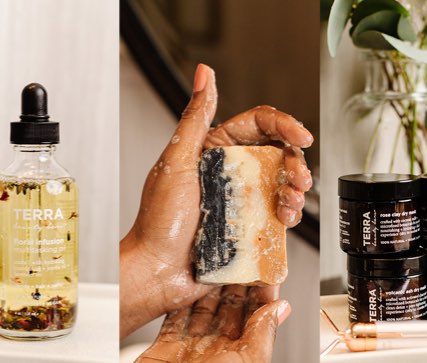


Your differences make the difference
Akruti’s story is timeless because it speaks to our history as a nation. Culture sharing is a huge part of our collective experience—it’s how bagels and pizza can be considered New York cuisine. While immigrants may have started selling their traditional fare to their countrymen and women, they eventually became part of our zeitgeist. They were adopted by everyone, shaped into something original, and became part of the region’s cultural identity.
That spirit endures. It’s what drove Angela Gomes and her three children—Luana, Fernanda, and Jasmine—to set up Terra Beauty Products. Angela grew up on a small farm in Brazil, where her family subsisted entirely off their land. There, she learned how to make “beauty bars,” which were soaps made from 100% plant-based, vegan ingredients. Although she moved from Brazil to Florida to raise her family, she kept a connection to her past by teaching the same beauty techniques to her children. What was once a necessity became a fun family tradition.



Your differences make the difference
Akruti’s story is timeless because it speaks to our history as a nation. Culture sharing is a huge part of our collective experience—it’s how bagels and pizza can be considered New York cuisine. While immigrants may have started selling their traditional fare to their countrymen and women, they eventually became part of our zeitgeist. They were adopted by everyone, shaped into something original, and became part of the region’s cultural identity.
That spirit endures. It’s what drove Angela Gomes and her three children—Luana, Fernanda, and Jasmine—to set up Terra Beauty Products. Angela grew up on a small farm in Brazil, where her family subsisted entirely off their land. There, she learned how to make “beauty bars,” which were soaps made from 100% plant-based, vegan ingredients. Although she moved from Brazil to Florida to raise her family, she kept a connection to her past by teaching the same beauty techniques to her children. What was once a necessity became a fun family tradition.
“All three of us grew up doing our nails, and having a tray full of nail polishes,” Fernanda says. “It’s a part of our story. So when we grew up and we wanted to start a business, we all knew that we wanted to do exactly what we saw our mother doing.”
Terra Beauty Products has gone on to win a host of beauty awards. They’ve secured wholesale contracts with some of the biggest retailers in the world, and they have a growing social community of loyal brand advocates. The company has thrived because the Gomes family is doing something intensely personal; it's part of who they are.
“A lot of times our differences scare us; we’d rather fit in and be the same. But it’s our differences that make the difference—they make us unique. I think that there’s so much power in that, and a lot of people don't realize it,” Angela says. “It's always been so important for us to say we’re Latin-owned and women-owned. I want my daughters to know there are Latin people out there going beyond what society thinks that they should be doing.”
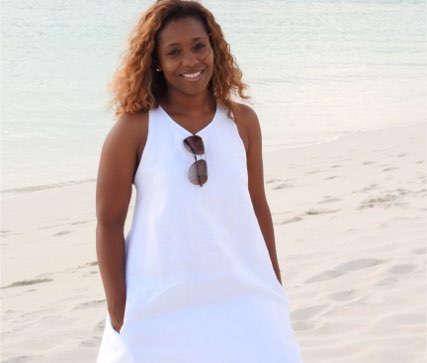


My community gave me purpose
Tamika Goins also credits her childhood experiences as the motivation to set up her company, CareHalo. Having grown up in LaPlace, Louisiana—a town in a region known as Cancer Alley—Tamika’s business is also a social mission. LaPlace is home to more than 150 petrochemical plants and refineries, and accounts for more than a quarter of all petrochemical production in the U.S.
Minorities are up to two times more likely than white people to suffer from chronic illness in the U.S., and growing up in LaPlace made Tamika very aware of the pain that causes to minority families. Her grandmother was one of 17 children; 14 passed away from chronic illness.
My community gave me purpose
Tamika Goins also credits her childhood experiences as the motivation to set up her company, CareHalo. Having grown up in LaPlace, Louisiana—a town in a region known as Cancer Alley—Tamika’s business is also a social mission. LaPlace is home to more than 150 petrochemical plants and refineries, and accounts for more than a quarter of all petrochemical production in the U.S.
Minorities are up to two times more likely than white people to suffer from chronic illness in the U.S., and growing up in LaPlace made Tamika very aware of the pain that causes to minority families. Her grandmother was one of 17 children; 14 passed away from chronic illness.
“It was very obvious to me from a young age how many people suffer from chronic illness like diabetes and hypertension,” says Tamika. “Also, how much additional care those patients require from their family to be able to have a good quality of life. It puts a huge stress on both their families and the health system.”
Tamika felt that Remote Patient Monitoring (RPM) was the best way to lighten the burden on family caregivers while also ensuring that those with chronic conditions were closely monitored and protected. But she also wanted her business to be accessible to everyone, and to be a clinical aid for those living around or below the poverty line.
“With most RPM companies, the patient gets a device that measures their vitals, then sends them to a doctor in a different location,” Tamika tells us. “But what’s the point in gathering all this data, all this vital health information, if there’s not enough resources on the receiving end to look at it and make meaningful use of it? CareHalo is different because we add the clinical piece. We combine the health information with our own network of nurse practitioners and diabetic educators, so we can supplement at-home care teams.”
Tamika is blazing a trail in a sector that’s not used to powerful black women. “I’m usually the only person of color at meetings, and I’ve not met another female CEO in healthcare technology. You’ve got to trust what you know to survive. You can’t be intimidated,” says Tamika.
But as she knocks down doors in a sector that’s traditionally dominated by white men, she’s never lost track of her roots. Tamika not only fights for communities like the one she grew up in, she’s also a powerful public advocate for their struggles.
“Chronic conditions affect black and brown people more than anyone else in this country. I’m a big believer in representation, so I’m happy to put my face and my story to it,” Tamika says.
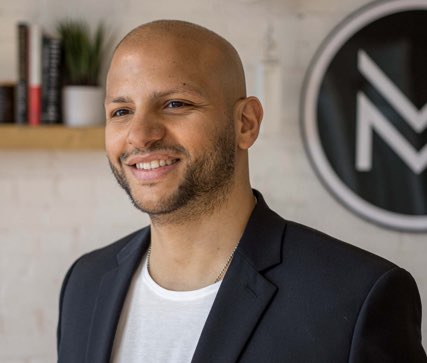


This is only the beginning
Great business ideas can come from anywhere—from moments of inspiration to lifelong obsessions. For the winners of the 2022 FedEx Distinction Award for minority-owned businesses, Eric and Ryan Cruz, their empire started with a pair of old slippers.
Ryan, who studied industrial design at NJIT, tells us, “Our senior thesis was to invent or reinvent a consumer product. And we saw our dad going in and out of the house in his slippers all the time, just out to the garage, and they were falling apart!”
Ryan and his brother Eric built a prototype that would reinvent home footwear. Their company, Muvez, devised a home slipper that can slip easily in and out of a detachable eva sole. Together, they form a fashionable, durable, and comfortable outdoor shoe, and a cozy slipper to wear around the house.



This is only the beginning
Great business ideas can come from anywhere—from moments of inspiration to lifelong obsessions. For the winners of the 2022 FedEx Distinction Award for minority-owned businesses, Eric and Ryan Cruz, their empire started with a pair of old slippers.
Ryan, who studied industrial design at NJIT, tells us, “Our senior thesis was to invent or reinvent a consumer product. And we saw our dad going in and out of the house in his slippers all the time, just out to the garage, and they were falling apart!”
Ryan and his brother Eric built a prototype that would reinvent home footwear. Their company, Muvez, devised a home slipper that can slip easily in and out of a detachable eva sole. Together, they form a fashionable, durable, and comfortable outdoor shoe, and a cozy slipper to wear around the house.
It takes a whole lot of effort, money, and support to turn a senior-year thesis into a consumer product, and the footwear industry is notoriously hard to break into. So the Cruz brothers had to be clever about how they found funding.
“We didn’t have any access to capital. As minorities, you often don’t have access to a vast network of high-income individuals,” Eric tells us. “We had to be smart about it, staying ahead of every pitch event or grant event so we could act fast on them. But relying on our ingenuity and our perseverance could only take us so far. To compete in this market at a high level you need the liquidity and financing behind you.”
Fortunately for Ryan and Eric, their innovative product and personal potential helped them find mentors and supporters along the way. Pat McGowan provided an early investment of $90,000 to support the business during the critical early stages. And they attracted the attention of Lou Carrega, a talented industry veteran who connected them to manufacturers in China that helped them develop the product.
The team was doing everything right, and little by little they were building up recognition of their brand. But in 2020, those gradual gains made way for a huge leap when the Cruz brothers got to pitch their product on ABC’s Shark Tank. It was a big moment for Muvez, and not just because of the investment and incredible advertising it provided to the brand. For Eric, it also showed 8 million viewers that the kids of first-generation Americans could compete with the heavyweights of the footwear industry.
“There really isn’t a lot of representation of our background in this space. You have to be the first, and that’s something really meaningful that we take a lot of pride in,” Eric says. “We want to represent those that don’t have a voice, and that don’t have a platform and the capabilities that we’ve been blessed with. We want to give back throughout the process.”
Unfortunately, Lou, an early mentor, passed away before seeing his protégés swim among the sharks, but Eric and Ryan keep his spirit alive through charitable giving and supporting the next wave of young entrepreneurs.
“We’re really passionate about partnering with charitable organizations and nonprofits, and we really look forward to taking those that are deserving along for the ride,” states Ryan. “We’ve worked with Soles for Souls and The Wounded Warrior Project. And during COVID-19 we’ve donated products to the medical staff at St. Mary’s in Hoboken and CarePoint in Hackensack, New Jersey. This is only the beginning for us.”
Related reading
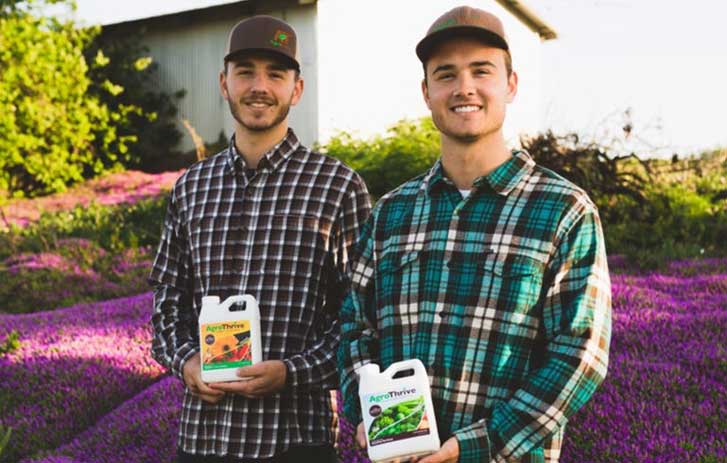
AgroThrive: Together we thrive
Learn about 2023 Small Business Grant (a legacy program) winner, AgroThrive.
Read article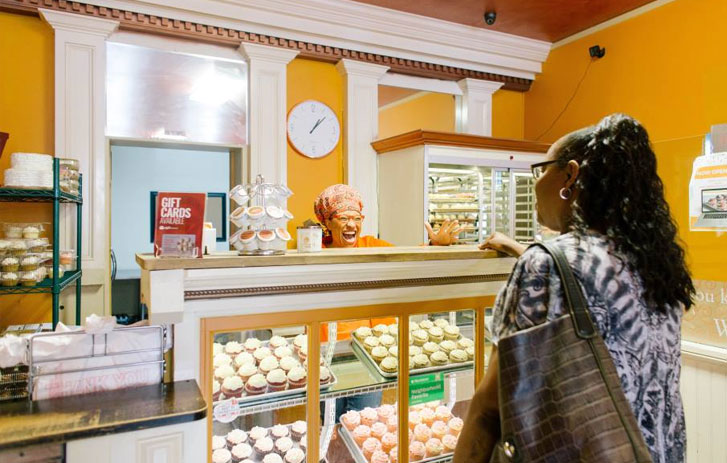
The Cupcake Collection: Delivered with love
Learn about 2023 Small Business Grant (a legacy program) winner, The Cupcake Collection.
Read article